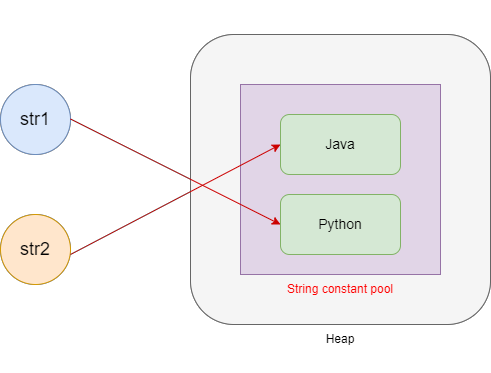Why Are Strings Immutable in Java? Enhancing Code Dependability
Why Are Strings Immutable in Java? Enhancing Code Dependability
Blog Article
What Is Unalterable Strings and How It Works
In the realm of shows, recognizing the principle of immutable strings is critical for developing durable and safe and secure applications. Unalterable strings refer to strings that can not be modified after they are produced, making certain data integrity and predictability within the code.
The Basics of Unalterable Strings
Unalterable strings, as a basic principle in programs, are personality sequences that can not be changed as soon as they are produced. This suggests that as soon as a string is assigned a worth, that value can not be modified. In languages like Python and Java, strings are unalterable objects, bring about various effects in terms of memory monitoring and data honesty.
One of the vital advantages of immutable strings is that they provide a complacency in information control. Given that the material of an immutable string can not be changed, it ensures that the initial information stays undamaged, lowering the threat of unexpected modifications throughout program implementation (Why are strings immutable in Java?). This residential property likewise streamlines debugging procedures, as developers can trust that when a string is specified, its worth will not be accidentally changed
In addition, unalterable strings assist in reliable memory use. When a new string is created based on an existing one, instead than customizing the original string, the brand-new worth is stored individually. This strategy enhances efficiency by minimizing memory fragmentation and simplifying memory appropriation processes. Generally, recognizing the fundamentals of unalterable strings is crucial for grasping programming ideas and optimizing code performance.
Benefits of Unalterable Strings
Building upon the safety and performance advantages of unalterable strings, their advantages reach enhancing code reliability and simplifying simultaneous shows jobs. By being immutable, strings can not be modified after development, which removes the danger of unexpected modifications in the data they save. This intrinsic immutability makes certain that once a string is created, its value stays continuous throughout the program's implementation, reducing the chances of bugs triggered by unanticipated changes.
Additionally, immutable strings add to code dependability by making it less complicated to reason about the state of a program. Given that strings can not be changed, developers can rely on that a string will constantly hold the exact same worth, simplifying debugging and maintenance efforts. This predictability results in a lot more stable and reputable codebases.

Implementation in Programming Languages
Within numerous programming languages, the unification of unalterable strings is a fundamental aspect that impacts exactly how data is handled and adjusted within code structures. The application of unalterable strings differs throughout different shows languages, with each language providing its very own systems to support this principle.

In comparison, languages like C and C++ do not have integrated assistance for immutable strings. Programmers in these languages have to by hand execute immutability by implementing rules within their code to avoid direct modifications to string objects.
Ideal Practices for Collaborating With Unalterable Strings
When taking care of unalterable strings in programs languages like Java and Python, adhering to best techniques makes sure safe and secure and reliable information control. One of the crucial finest methods is to make use of StringBuilder or StringBuffer as opposed to straight adjusting strings, specifically when managing comprehensive concatenation operations. These courses provide mutable alternatives for string manipulation, helping to stay clear of unnecessary memory allotments and improving performance.
An additional ideal practice is to make use of string interpolation or formatting functions provided by the language instead of hands-on concatenation. This not only improves readability but likewise aids in stopping common pitfalls such as unintended string modifications. In addition, when dealing with delicate information such as passwords or API keys, it is crucial try here to prevent keeping them as plain message in unalterable strings. Making use of secure storage space systems like char selections or specialized libraries for managing delicate info assists alleviate safety threats connected with immutable strings.
Real-world Applications and Examples
Discovering practical implementations of unalterable strings in different sectors reveals their substantial influence on data stability and system integrity. In the health care sector, unalterable strings play a critical role in guaranteeing the safety and security and confidentiality of person data. By avoiding unauthorized modifications to sensitive details such as clinical records and prescriptions, immutable strings assist maintain compliance with strict privacy guidelines like HIPAA.
Economic institutions likewise gain from the immutable nature of strings to improve the safety of consumer data and deal documents. Unalterable strings aid stop scams and unauthorized changes to economic info, providing a robust defense against cyber dangers and making certain the trust fund and confidence of clients.

Conclusion
Finally, immutable strings are fixed and stable sequences of characters that provide benefits such as string security and enhanced efficiency in shows. They are applied in different programming languages to ensure data integrity and protection. Finest techniques for dealing with immutable strings web consist of avoiding straight alterations and utilizing approaches that return brand-new string things. Real-world applications of unalterable strings include data security, caching, and string adjustment tasks.
Immutable strings refer to strings that can not be changed after Related Site they are produced, making certain information integrity and predictability within the code. When a new string is produced based on an existing one, instead than customizing the initial string, the brand-new worth is saved individually.In languages like Java and Python, strings are immutable by default, indicating that when a string item is created, its worth can not be changed - Why are strings immutable in Java?. Finest techniques for functioning with unalterable strings consist of preventing direct modifications and using approaches that return new string things. Real-world applications of unalterable strings consist of data file encryption, caching, and string manipulation tasks
Report this page